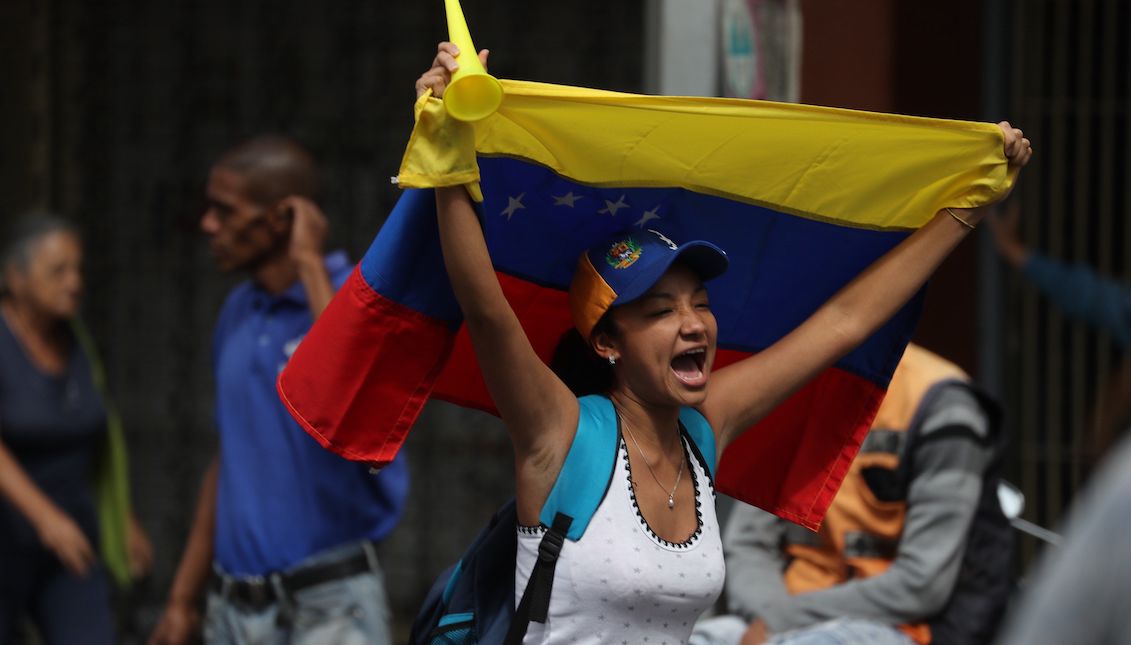
January 23 in Venezuela: mass protests take to the streets
Thousands of Venezuelans have taken to the streets to demand the resignation of Nicolás Maduro, echoing the international recognition of the regime as…
In the midst of one of the worst humanitarian crises in the region, thousands of Venezuelans have taken to the streets on Jan. 23, answering the call of the opposition to the Nicolás Maduro regime.
Given the serious decline of the constitutional state in the country, a new opposition was organized in 2017 to maintain the authority of the National Assembly, especially after President Maduro was sworn in for a new term on January 10 without international recognition.
The U.S. and several governments in Latin America have called Maduro an "illegitimate dictator," urging the establishment of a "transitional government," according to the New York Times.
Thanks to this support, the majority of the Venezuelan National Assembly, led by its new president Juan Guaidó, has decided to commemorate the 61st anniversary of the coup d'état that put an end to the dictatorship of General Marcos Pérez Jiménez in the country, making a new call to "freedom.”
Hace 60 años la unión de un pueblo llevó a #Venezuela a retomar la democracia que había sido arrebatada por un dictador. Hoy tenemos el mismo deber de esos venezolanos que unieron sus voces. Por ellos #NosVemosEl23 pic.twitter.com/lke6ZMkUO9
— Juan Guaidó (@jguaido) 20 de enero de 2019
Guaidó and political leaders such as María Corina Machado have insisted that "the moment is now," and have extended their invitation to the Armed Forces to support street demonstrations during the day. Several national guards answered with attempts of an uprising and individual communications.
Although the Venezuelan opposition has struggled to remain in force, especially after the creation of independent bodies by the government, this first demonstration of 2019 has the support of governments and international organizations demanding the resignation of Nicolás Maduro.
The Inter-American Commission on Human Rights (IACHR), for example, issued a statement on Wednesday reminding the Venezuelan executive that the rights to protest and freedom of expression are "fundamental pillars in democratic societies," amid fears that reprisals from the police forces will again leave a death toll, as has happened on previous occasions.
RELATED CONTENT
In addition, the Secretary General of the Organization of American States (OAS), Luis Almagro, granted his support to Guaidó to act as interim leader of the country to ensure a transition process.
In the U.S., Republican Senator Marco Rubio also asked President Donald Trump to recognize Guaidó as the legitimate president.
I was scheduled to be in the Florida Panhandle today. But last night @POTUS convened a meeting for today in the Oval Office with himself, @VP & his national security team to discuss #Venezuela.
— Marco Rubio (@marcorubio) 23 de enero de 2019
It’s now clear crisis is about to enter a new phase which will require new options. https://t.co/hhMHrQmp3z
Earlier, Vice President Mike Pence posted a video in which he called Maduro a "dictator" and reiterated the U.S. government's support for the opposition.
"While they make their voices heard, in the name of the American people we say to the good people of Venezuela: we are with you," he said.
However, Wednesday began in Venezuela with growing tension, after several demonstrators set fire to a statue of the late President Hugo Chávez in Bolívar state the night before.
#22Ene #Guayana Incendian estatua de Hugo Chávez Frías, ubicada cerca de La Revancha en la parroquia Dalla Costa,San Félix. pic.twitter.com/HcgA0JYYNW
— Pableysa Ostos (@PableOstos) 23 de enero de 2019
According to national media reports, several people were injured, and at least one dead protester was reported early in the day. In addition, about 43 people had been arrested in several protests earlier in the week, the government has deployed security operations throughout the capital and organized counter-protests with groups that still support their administration.
The hope shared by the opposition and those demonstrating in the streets is that, faced with social pressure in the street, the Armed Forces decide to support the people and join the request for resignation.










LEAVE A COMMENT: